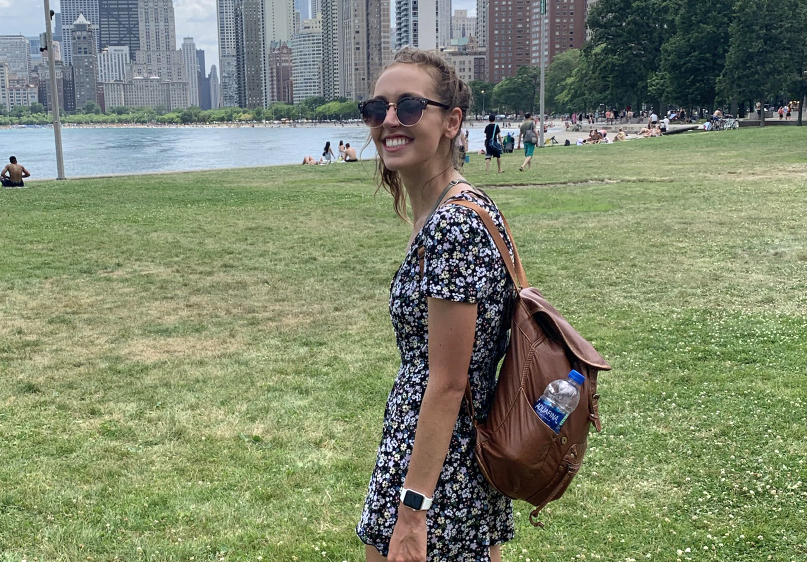Public Health Buckeyes: Ariana Pitcher
Ariana Pitcher used her passion for public health to shape her Ohio State experience, from student government to conducting research on the opioid epidemic.

Ariana Pitcher, a senior specializing in public health sociology with a minor in pharmaceutical sciences, has
Question and Answer
Why did you choose public health?
Honestly, I wasn't fully aware of what public health was when I declared it as my major. I came into college with the goal to eventually pursue medicine and understood that I could achieve that with almost any major. However, I wanted a degree that would broaden my perspectives of human and societal health beyond traditional hard-science coursework.
Moreover, I’ve always valued educating myself on current issues. My family has a history of political involvement, and I knew I had similar interests but from a health care angle. I also knew Ohio had an immense problem with the opioid crisis, and I saw the opportunity to learn more about the crisis by studying public health.
Can you tell us a bit about your extracurricular work and activities?
As part of the college’s Undergraduate Student Advisory Committee, I sit in on meetings with advisors and faculty to discuss college matters like admissions, curriculum and student development. I do my best to provide the student perspective.
I’ve also had several roles within Undergraduate Student Government. My first year, I served as a senator representing the College of Public Health. In this role, I worked on legislative agendas that addressed problems within the university and offered solutions, such as exhibiting more transparent nutritional data in dining halls and putting mental health statements on syllabi. This past year, I became a director on the Health & Safety Committee and worked on projects related to the Wilce Student Health Center. I also represented students at student health insurance meetings and was on the student health advisory board. Since the pandemic, I’ve been part of an Office of Student Life task force working on the return to campus.
How have these experiences enriched your time at Ohio State?
These experiences have been especially valuable in inspiring me to exercise advocacy, collaboration and inclusion. Interacting with faculty and administrators has opened my eyes to the extent of work that’s put in to improve student resources and the logistics behind policy implementation, This work has also given me a greater purpose and meaning while contributing to the campus community. Advocating for a cause, working with people from different backgrounds and considering the impact of decisions on various populations are activities I foresee in my future as a physician who values public health.
Can you tell us a bit about your undergraduate research experience, both at OSU and Northwestern?
For two summers, I’ve been a laboratory technician at Northwestern Medicine. There, I complete laboratory tests from inpatient and outpatient services and some surgical operations. These tests help ensure patients receive an accurate diagnosis, and I get to collaborate with physicians, microbiologists, cytologists and other technicians.
At Ohio State, I'm completing my senior thesis with health services management and policy professor Dr. Wendy Xu. After I took her class on U.S. and international health care, I realized my passion for health policy and started to help with some of Dr. Xu’s projects. Now, she’s advising my research, which is on the correlation between the availability of Ohio providers who prescribe treatment for substance abuse disorders and mortality rates.
What advice would you give incoming students?
First, I would encourage students not to partake in activities solely to impress others or for an application. I originally did this and found myself both unhappy and stressed out. Definitely carve your own path and find your passion.
How do you see your education shaping your future?
Switching my major to public health was one of the best decisions I made in college. It has given me a new framework to analyze health and inequitable social determinants of health. Now, whenever I hear about health problems, I instinctively investigate them through a public health lens and consider the social and physical factors that contributed. The value of public health in both prevention and primary care has influenced me to want to complete a dual MPH/MD degree and become a community physician. Someday I also see myself running a public health program.
About The Ohio State University College of Public Health
The Ohio State University College of Public Health is a leader in educating students, creating new knowledge through research, and improving the livelihoods and well-being of people in Ohio and beyond. The College's divisions include biostatistics, environmental health sciences, epidemiology, health behavior and health promotion, and health services management and policy. It is ranked 22nd among all colleges and programs of public health in the nation, and first in Ohio, by U.S. News and World Report. Its specialty programs are also considered among the best in the country. The MHA program is ranked 5th and the health policy and management specialty is ranked 21st.